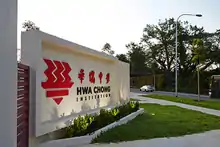Hwa Chong
Hwa Chong is a educational brand name in Singapore encompassing Hwa Chong Institution, its affiliated institutions, as well as the former Hwa Chong Junior College.
Affiliated Schools

The affiliated schools under the brand name "Hwa Chong" is referred as the Hwa Chong Family of Schools.
Hwa Chong Institution
Hwa Chong Institution (HCI) is a premier educational institution in Singapore. Established in January 2005 with the merger of The Chinese High School and Hwa Chong Junior College, the institution offers a six-year integrated programme with partnership with Nanyang Girls' High School leading to the Singapore-Cambridge GCE Advanced Level examination.[1]
Former Hwa Chong Junior College
The former Hwa Chong Junior College (HCJC) is a premier junior college in Singapore. Established in 1974, the college is one of the top performing junior colleges in Singapore in the 1990s. The college merged to form the current College Section of Hwa Chong Institution in January 2005 after the introduction of the Integrated Programme.[1]
Hwa Chong International School
Hwa Chong International School (HCIS) is an international school in Singapore, and the international wing of Hwa Chong Institution, its parent institution. Founded in 2005, it offers an independent international school programme leading to the International Baccalaureate qualification.
Hwa Chong Institution Boarding School
Hwa Chong Institution Boarding School is a boarding school built by the Hwa Chong family of schools, offering boarding options for students under the Hwa Chong affiliated schools, as well as students from other local institutions.
Origin
The name "Hwa Chong" was first used in 1972 when it was adopted as the name of Singapore's second junior college, and the first government-aided junior college. The name was intended as a direct translation of the abbreviation of the Chinese High School's native name, "華中" (Hua Zhong), which corresponds to "南洋華僑中學" (Nanyang Hua Qiao Zhong Xue). This was to reflect the affiliation of the Hwa Chong Junior College to the Chinese High School, despite being run by separate but related management committees. This is also reflected in the initial native name of the college, "華僑中學附屬初級學院", which translates to "Junior College affiliated to the Chinese High School". The name was shortened to "華中初級學院" in correspondence to its formal name.[2]
In 2004, the decision of merger between Hwa Chong Junior College and the Chinese High School led to the conflict of interest of the name of the merged institution. This is in view of the expectations of alumni, staff and stakeholders in preserving the name and heritage of both independent schools. The finalised name of the merged educational organisation, through a series of balloting, adopted the name "Hwa Chong" from the junior college as the formal name, while retaining the native name of the Chinese High School.[3][4]
The name, Hwa Chong, had since been adopted in schools in Singapore and overseas that are established under the educational organisation encompassed under Hwa Chong Institution, as the institution sets to widen its educational excellence as a global brand.[5][6]
Identity
Emblem
The emblem shared across the Hwa Chong Family of Schools is in a form of the traditional Chinese character "學" (xué), which literally meant to learn. The crest, with a red background, also bears much similarity to a burning torch of passion.[7]
References
- "About us", Hwa Chong Institution, Retrieved 30 August 2012.
- "Speech by DPM Lee Hsien Loong, at the 25th Anniversary Homecoming Carnival of Hwa Chong Junior College, Sun 30 May 99, 10 AM". www.nas.gov.sg. Retrieved 2017-10-15.
- "华中校长洪伟雄将在今年底退休". 联合早报网. 2009-10-31. Retrieved 2017-10-15.
- Ng, Jane (12 November 2008). "Not just a badge or motto: It's an identity". Asia One. Retrieved 2017-10-15.
- "Interview with Dr. Hon Chiew Weng". Singapore Memory. Retrieved 2017-10-15.
- NAIR, SURESH. "Nurturing future leaders". The Business Times. Retrieved 2017-10-15.
- Zhuang, Justin (2013). School Crest Examination. Singapore: National Heritage Board. pp. 18–23. ISBN 978-981-07-6524-8.